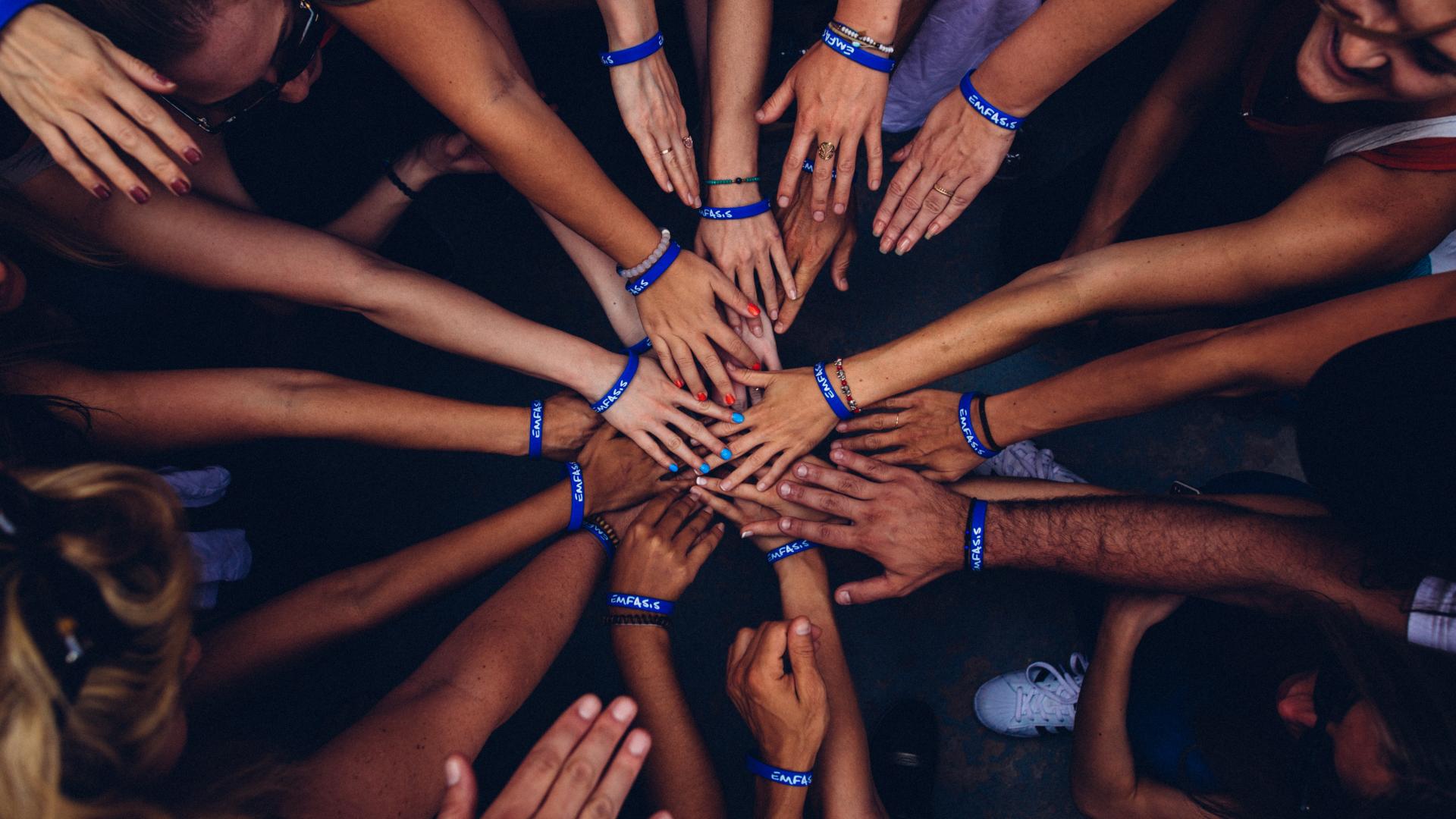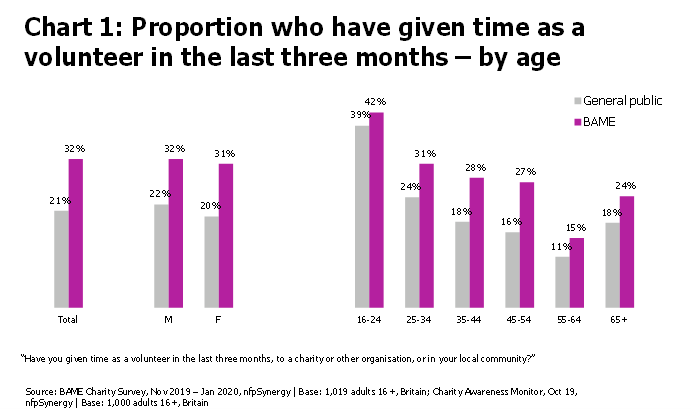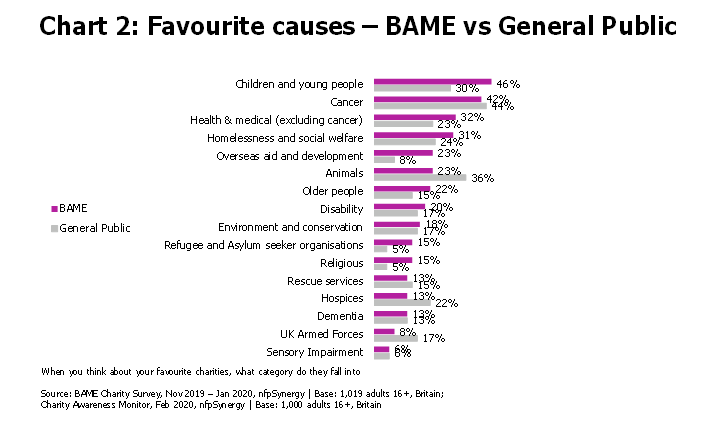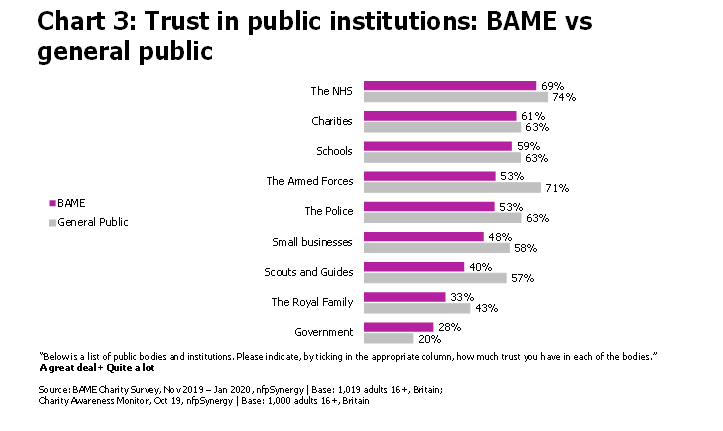New research with 1,000 members of Britain’s BAME population
Late last year, and early this year, nfpSynergy carried out research with 1,000 individuals of Black, Asian and Minority Ethnic (BAME) origin. Our aim was to try and find out more about the ways that this audience engaged with charities by mirroring questions in our Charity Awareness Monitor (CAM). To the best of our knowledge, this is one of the first pieces of research looking across the board with a BAME sample at charities. Our questions covered fundraising, volunteering, demographics, trust in institutions, favourite causes and both spontaneous and prompted awareness of charities. The full set of slides is available here. In this blog we look at three specific areas: volunteering, favourite causes and trust in institutions.
1. Volunteering levels higher in every age group in the BAME population
We asked respondents to tell us whether they had volunteered in the previous three months and 32% of respondents said they had, against 21% in the general public. Chart 1 shows the age and gender breakdown of the BAME results against the general public in the grey bars. The results in the younger age group of 16-24-year olds are high and relatively close (42% vs 39%) and low and close in the 55-64-year olds age group (15% vs 11%). For the other age groups all have a difference of more than 5% and from 35 to 55-year olds the difference is 10% or more. This is why we would conclude that BAME volunteers are probably at the heart of many community responses to the coronavirus epidemic.
2. Children and young people are most popular cause to support
In our tracking research, we ask what category respondents favourite causes fall into. We wanted to see how the BAME sample’s answers differed from the general public’s and the results are shown in Chart 2. Some of the results are broadly similar (i.e. +/-3% are cancer, disability, dementia, rescue services and environment & conservation). However, there are four areas where the difference is 10% or more higher. These are children and young people (46% vs 30%), overseas aid and development (23% vs 8%), religious (15% vs 5%), refugees and asylum seekers (15% and 5%). Health and medical is just under 10% difference at 32% vs 23%. There are three causes where the BAME sample’s score is around 10% lower than the general public’s: animals (23% vs 36%), hospices (13% vs 22%) and UK armed forces (8% vs 17%).
3. Trust in public institutions lower except for charities
Another of our regular questions we ask of the general public is about trust in public institutions. We wanted to look at the comparison between the BAME population and the general public. The results are shown in Chart 3. The results show that the BAME sample’s and the general public’s level of trust in charities, as an institution, is almost equal (i.e. +/-3%). Whereas, the government is the only institution that is trusted considerably more by the BAME audiences (28% vs 20%). All the other institutions have lower levels of trust among the BAME population, with the Armed Forces, the Police, small businesses, and Scouts & Guides having a difference of more than 10% between the two populations.
In this blog we have deliberately avoided trying to analyse why any differences exist between our BAME and general public research. That is for more detailed qualitative research or others to speculate. These are only a taster of the results from our survey. More detail is included in the slides available from this link. We will be carrying out a similar piece of research in the summer with 1,000 members of the LGBT+ population. If you are interested in being kept up to date with either piece of research, do let us know by emailing insight@nfpsynergy.net
Our research with LGBT+ population will be freely available to the members of the Charity Awareness Monitor. Get in touch via CAM@nfpsynergy.net or download the briefing pack below to find out more.
Over the past 3 weeks The
Over the past 3 weeks The Ubele Initiative (Ubele) has been conducting a series of surveys and presentations of its findings on the impact of COVID-19 on BAME community and voluntary sector organisations. Wave 1 survey results were published online at: https://www.ubele.org/covid19-supporting-bame-communities. Also, our most overview of both wave 1 and wave 2 has just been posted with the final report coming out next week.
If interested in obtaining a copy, please email: karl.murray@ubele.org




